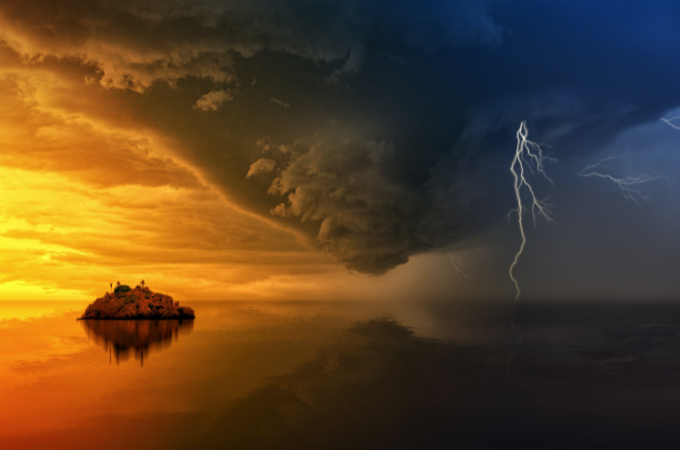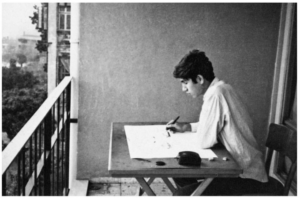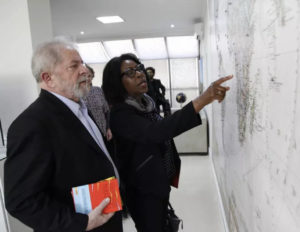
I have a special relationship with the poem “An African Thunderstorm” by my late grandfather, Prof David Rubadiri. Thrice I’ve been confronted with it, and with each reading, my eyes have struggled to untangle its web of meaning.
Growing up, I always knew that my grandfather was someone important, someone to know about, someone whose name may strike up conversations in certain circles. My father made a point of teaching me that, but as to what it entailed – him being a poet, playwright and professor – honestly, it was beyond my comprehension, especially at the tender age of fourteen.
I was just a high school student in South Africa, writing my end-of-year examinations when I first encountered the poem “An African Thunderstorm.” I reasoned as anyone might of at that age that perhaps us being blood relations would give me divine insight to the poem’s secrets. After all, I am a Rubadiri. Poetry runs in the blood, right? Well, the frantic scribbling that was my attempt of an analysis was furthest from the answer. The poem is not just about a thunderstorm destroying an African village. Far from it! But that realisation came later.
Seven years passed. I was an undergraduate student in Frankfurt Germany, studying political science. I took English studies on the side, thinking it’d be a refreshing break from the exhausting stack of serious German scholarships I had to read daily. To my surprise, in the most remote place I would have thought, my German professor sees my surname on the test sheet and instantly striked up a conversation with me.
“Mr Rubadiri, you know there is a famous academic by that name.”
“Yes, that would be my granddad,” I said shyly.
“Ohh! Maybe you can give a presentation on it. The class would love that.”
After his seminar, I walked out into the cold dark of winter. My face was whitened by the phone as I googled “An African Thunderstorm.” Again, I read it, and as before, I never saw it as anything more than a poem about a devastating thunderstorm. The difference then is that I could appreciate his sensitivity to language, recognising the purpose of certain literary devices like the metaphor of “pregnant clouds.” It’s a powerful way to think of rainclouds. The possibility of it being symbolic and allegorical was farthest from my mind. As for the presentation, it never came to pass. I didn’t trust myself to present the poem to the class and talk about my grandfather. It was an opportunity that I regrettably failed to seize. Consequently, it would take another seven years for me to effectively unravel the poem’s deeper meaning.
This time I was in Botswana. I had just started working as an English teacher, and my head of department informed me that we will be teaching “An African Thunderstorm” to the Form 3s. If coincidence was not enough, among the students in the class, my younger cousin was present, and as it were with me, I saw myself in him. His eyes were full of hope for divine insight as he wrestled with the question from the test I set, and like me, he was bested by it, but to his credit, the difference is that he – or the class to be precise – identified that the poem was about colonialism. They felt this true because they reasoned that “clouds come from the West” like Westerners came to Africa. Still, they couldn’t tell me precisely how the clouds and wind symbolise colonialism, which ultimately is the goal of the assessment and my job as their new teacher to explain.
So, for a third time, this poem confronted me, but unlike last time, my mind’s eye saw the writing on the wall. The poem is not just about colonialism but its ramifications, one that is felt to this very day, namely the westernisation of African life. The challenge for me was to sensitively read the symbols as the poet intended them, and this required a delicate line-by-line reading. I had to ask myself: what is wind; what are clouds; what are trees; how do they all fit under the umbrella of colonialism? Like I tell my students, in as much as your conclusion may feel true, it is your job as writers to guide the reader to your conclusion, demonstrating your train of thought.
Here is mine:
At surface level, the poem describes the terror of an encroaching thunderstorm. At first, there is the arrival of mighty western winds and dark clouds that are likened to a “plague of locusts.” Soon those clouds perch on the hill “like dark sinister wings.” They ride the wind “stately” though they are “pregnant” with what the reader believes to be rain. Strikingly, the rain never comes in the poem, yet it is anticipated thanks to the vivid illustrations of the clouds. “Jagged flashes” and a “rumble tremble and crack,” are the only manifestations of the storm we as readers witness despite our expectations, and this comes at the end.
Then where are the colonists?
The answer is in the clouds, literally. Rubadiri’s ambiguous use of language opens the poem to a world of meaning, and I cannot praise his nuanced imagery enough. Clouds can be read as Europeans. Like clouds, Europeans are white, come from afar and appear superior to Africans. Contingent to this metaphor, trees symbolise Africans in that they, like trees, are brown as well as firmly rooted to their land and age-old traditions. Because of the nature of colonialism, trees had to “bend” in subservience, but this is not indicative of inferiority. Rather the destructive nature of the storm mirrors the shift in political and social order under colonial rule. And like any storm, it is transient. The storm is not forever. The trees “bend” but never break! In a sense, it could explain our present crooked times and the need for us, the African village, to rebuild.
But what about the wind? It has an interesting relationship with the clouds. Though it is its own force, it carries the clouds from the West to Africa. It “whistles” and makes trees “bend.” Many of my students were quick to interchange the two as one force of violence, but I beg to differ. I suspect that wind alludes to time. There is a temporal element to wind. Consider the monsoons in East Africa or harmattan in West Africa. It has its seasons much like colonialism since we now live in the postcolonial world. Europeans came and went – of course leaving some residues – but by and large, it seems as if Rubadiri is teasing the idea of empires rising and falling as time passes through. Time, it appears, is a passive observer, watching the storm blow a world order over as it announces itself through the hyperbolic image of a whistle through trees.
There is much more to say about the poem, but in closing, I think this essay bears testimony towards the point of “pregnant clouds.” Europeans gave birth to an Anglo-, Franco- and Lusophone Africa, and we, in turn, enjoy a life that imitates European culture from the language we speak to the type of schools we attend. After all, my students study this poem in preparation for their IGCSE examination set by Cambridge University in England. Many of them will leave the continent in search of a better life in the West – home to the language they speak and the history they learn. What I failed to see through my fourteen years of reading this poem was the depth of the rabbit hole that is an African thunderstorm.
No wonder it enjoys its seat in many African anthologies. So long as it remains a testament to our everyday predicament as Africans, the poem will remain a fine piece of world literature for posterity to learn from.
Photo by Johannes Plenio from Pexels










COMMENTS -
Reader Interactions